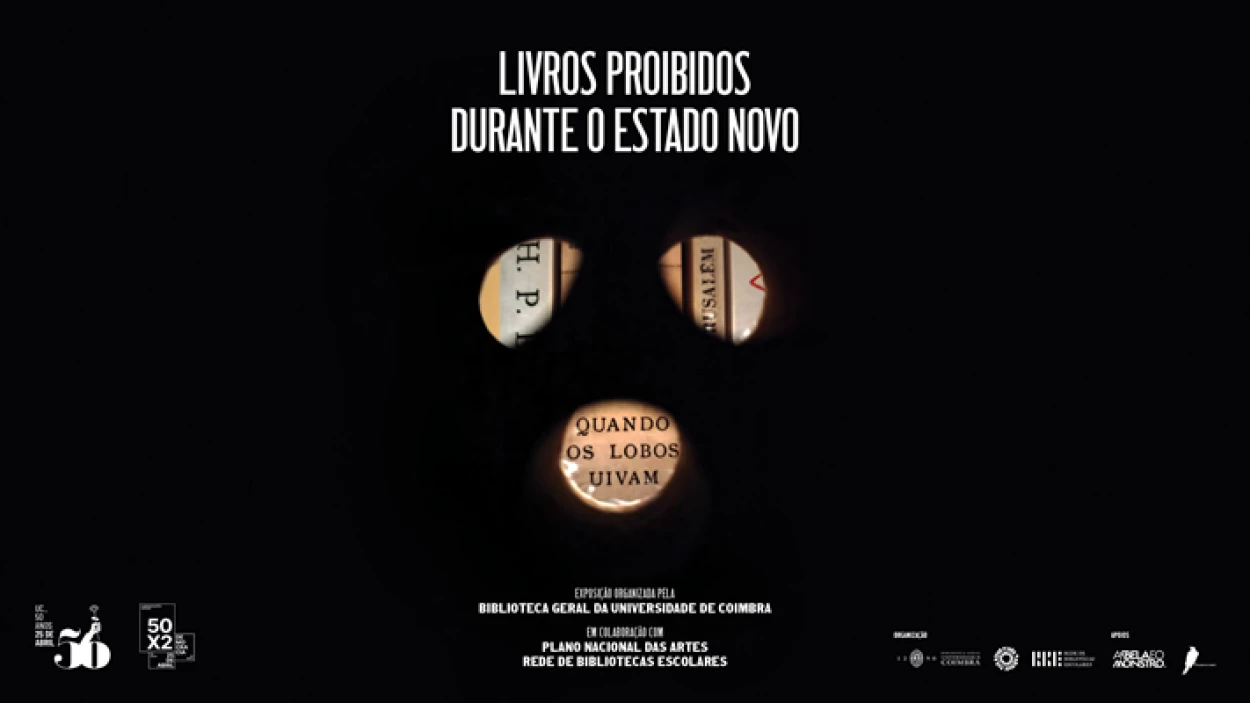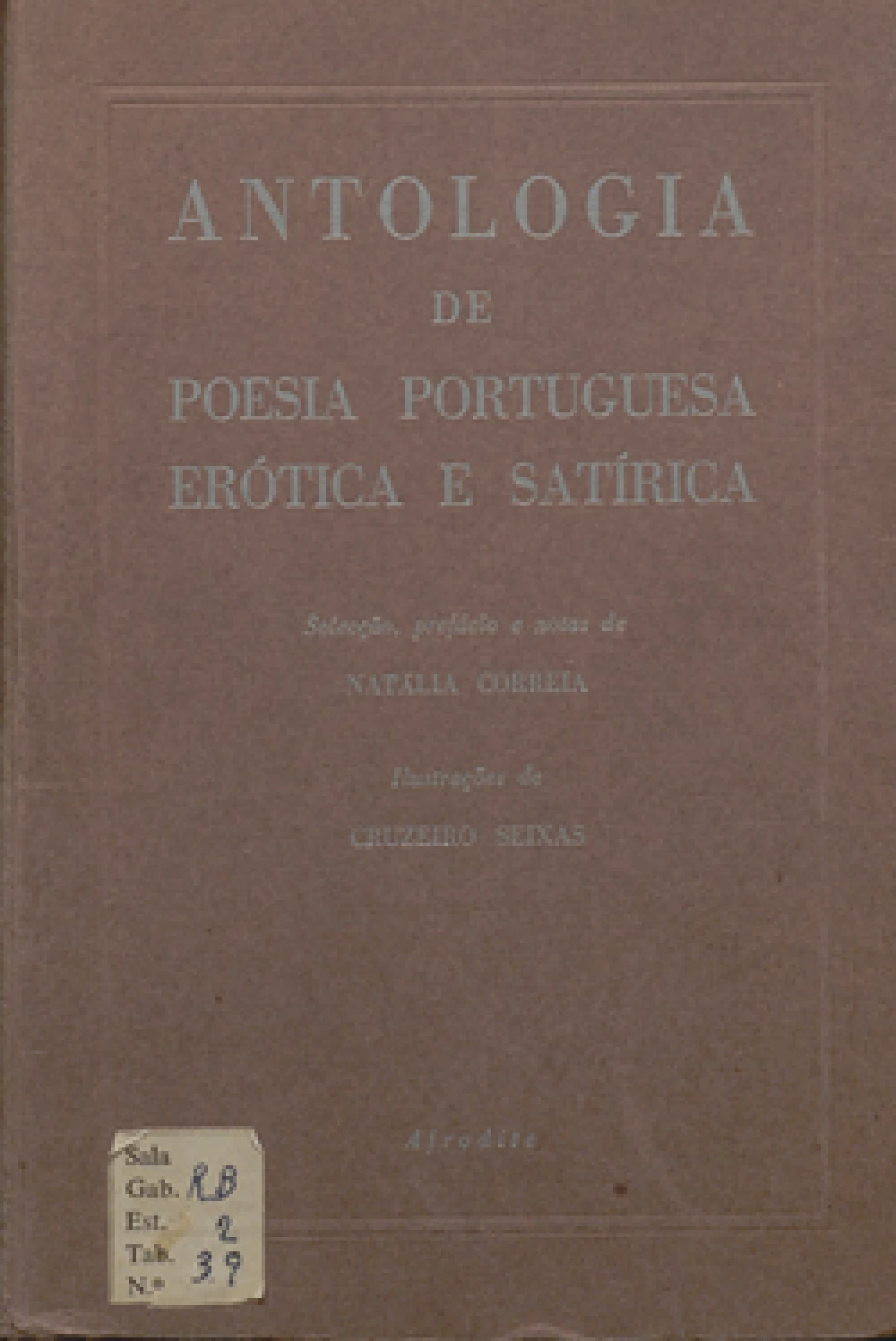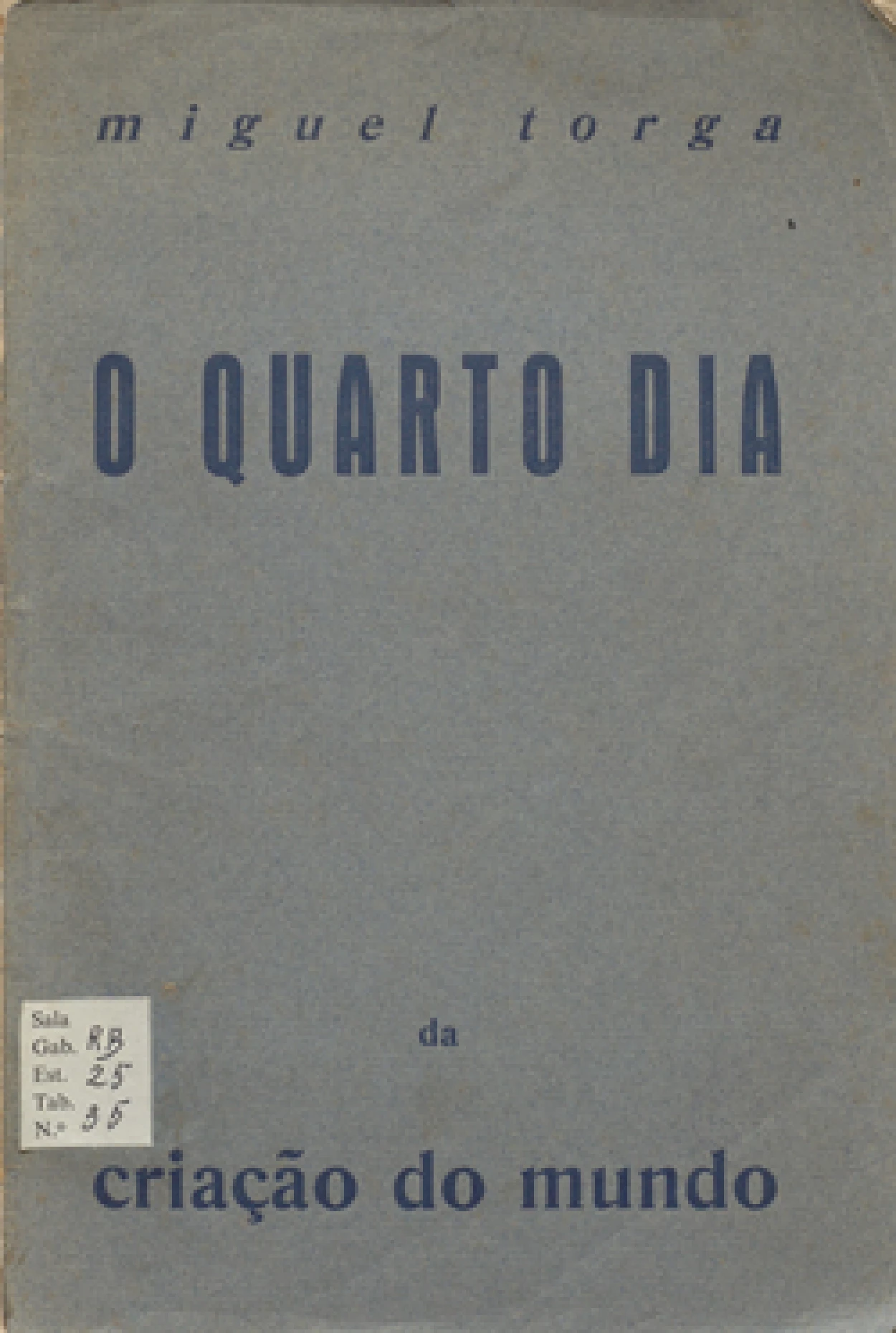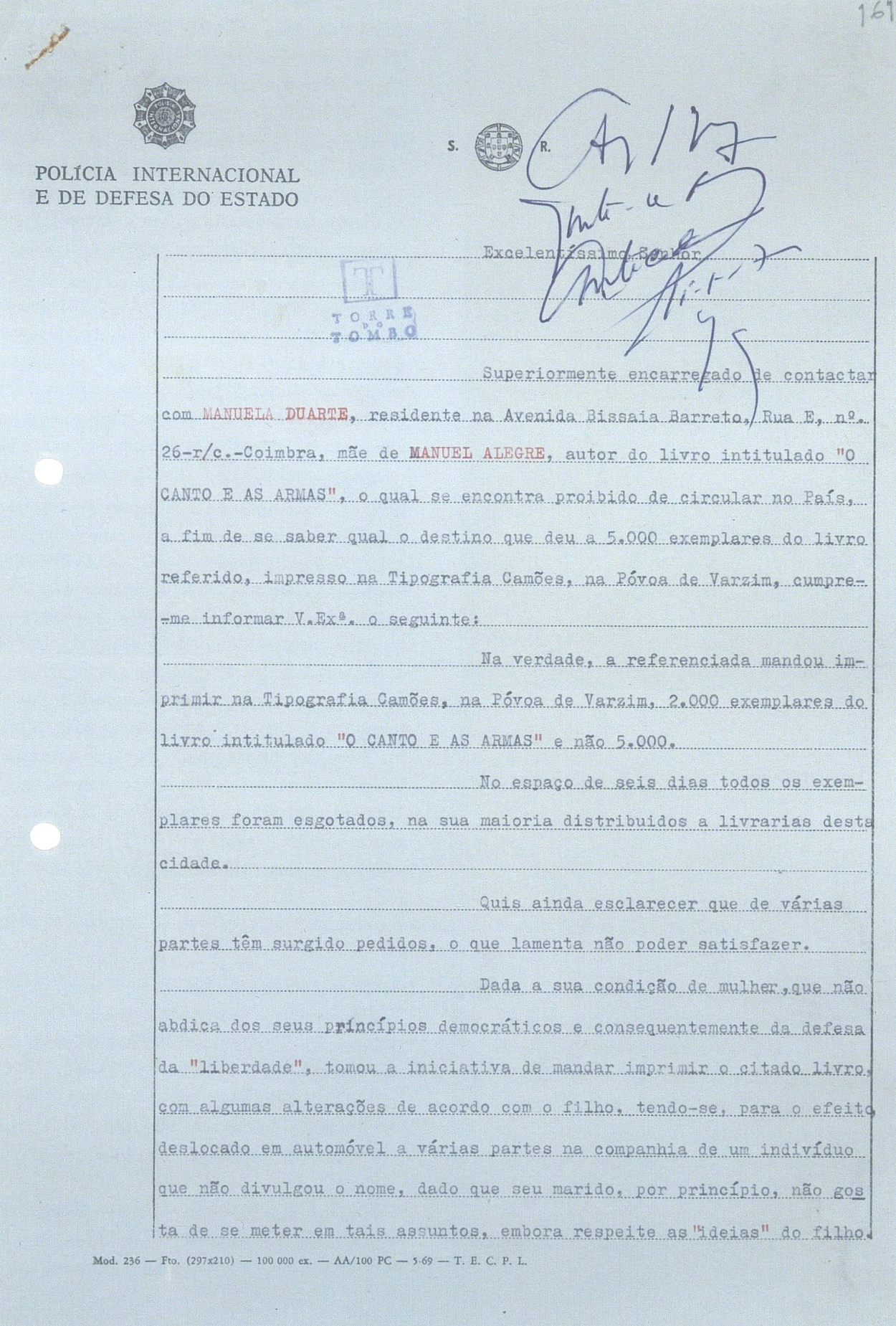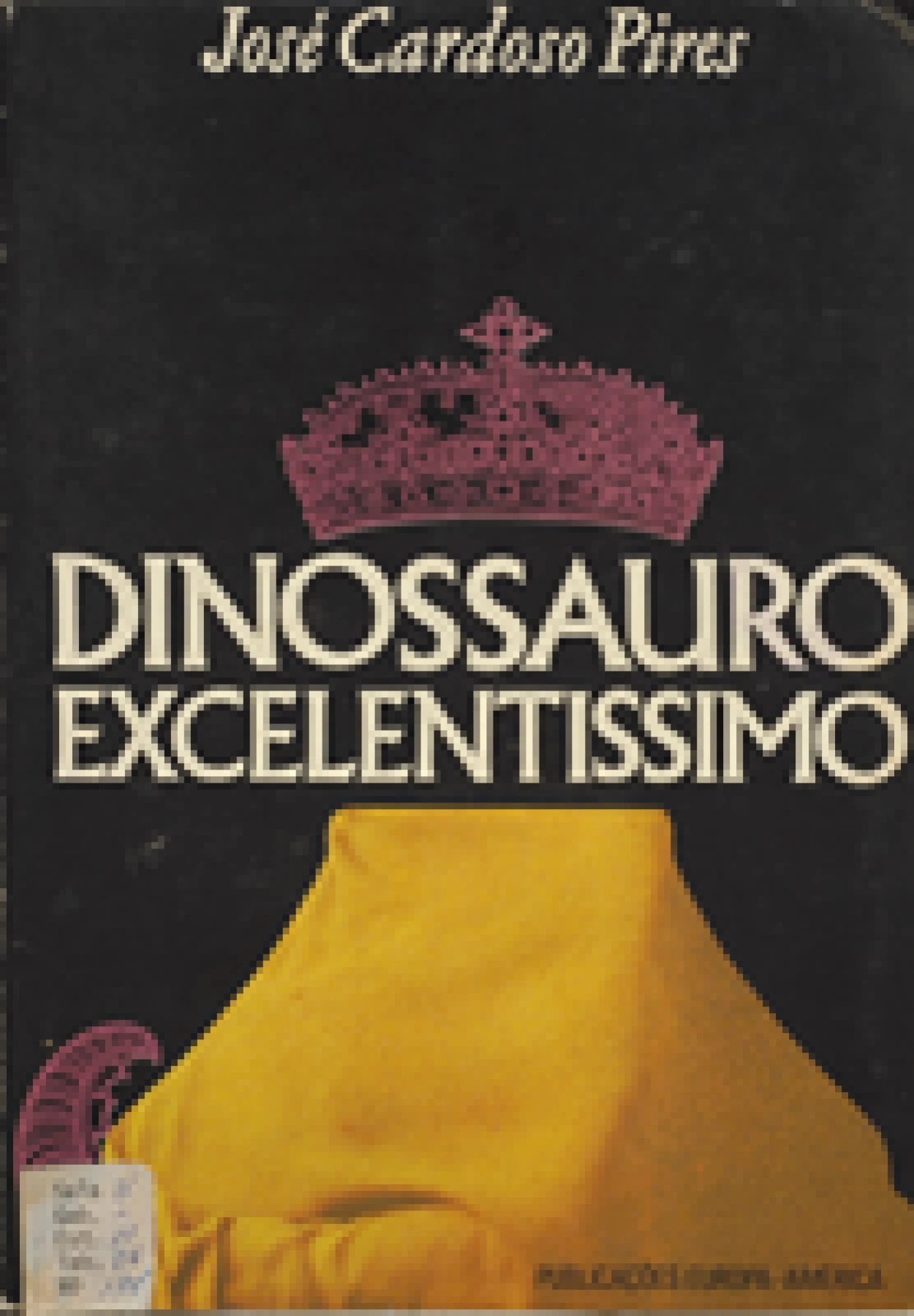Banned Books during the Estado Novo
A traveling exhibition about books and authors censored during the Estado Novo, curated by the General Library of the University of Coimbra, in response to a challenge by the local coordinators of the National Plan for the Arts and the National Network of School Libraries. “Banned Books during the Estado Novo” is part of the official celebrations of the 50th Anniversary of the 25th of April at the University of Coimbra and the Commemorative Commission for the 50th Anniversary of the 25th of April.
Five sets of copies of books banned during the Estado Novo (such as Quando os lobos uivam, by Aquilino Ribeiro, O Encoberto by Natália Correia), in fac-simile editions by the publisher A Bela e o Monstro, circulate in boxes through various school libraries. Designed by Atelier do Corvo, these boxes with a perforated front are part of the exhibition itself: one box will be closed, allowing you to peek at the spines of books that are inaccessible. The other one will release the books, in which a printed QR Code on a book band gives readers access to textual information about censorship procedures for each work, and to the order that banned it and/or to an excerpt of the work itself. All texts are read by actors from Coimbra.
Presentation
During the Estado Novo (1926-1974), newspapers, magazines, plays, films, and television broadcasts were censored before they reached the audience; this was called pre-licensing or prior censorship. Literature could also be censored, but generally only after it was published. There was no ability to examine everything in advance and if a book was banned after it was printed, the publisher's losses would be more serious. The exact extent of the activities of the Censorship Services Directorate is still unknown because its facilities in Lisbon were invaded by people on April 26, 1974, and part of the documentation was lost. It is estimated that the censors have examined between 7,000 and 10,000 books, many of them banned for being “improper” and their authors monitored or persecuted by the regime's Political Police.
In some cases, the reasons for the ban were almost ridiculous. Writing the word “red” could lead to a cut because the readers employed by the Censorship Services (initially, the military) could be left in doubt as to whether “red” referred to a communist. And, when in doubt, censorship is necessary! Sometimes, the Censorship Services would decide not to intervene so that banning a work would not end up giving it additional publicity.
The agent knocked on the door / Showed his card and said / We have been informed. / He went in / He went through the whole house / He searched the books./ It was already late / It was the second time./ He said / Beware. / He left / closed the door. / I closed myself off.
(Ana Hatherly, Poesia: 1958-1978, p. 62-63. Translation by MP)
One of the best-known banned works was the Antologia de Poesia Portuguesa Erótica e Satírica (1965) [Anthology of Portuguese Erotic and Satirical Poetry] because its banning and seizure for “offending general modesty, decency and public morality and social decorum” led those responsible to criminal trial, in the Boa Hora Plenary Court: despite the fact that the court “recognized the literary merit of the work”, Natália Correia (editor), Fernando Ribeiro de Mello (publisher) and most of the living authors included in the Anthology were sentenced to imprisonment or subject to a fine on March 21, 1970.
Since 1939, Miguel Torga was monitored as an “oppositionist” by the PVDE/PIDE, which gathered 455 pages of information about him, in various legal procedures. Some of his works were banned, such as O Quarto Dia, which won him two months in prison, but most of them were “neither Authorized nor Prohibited, for obvious reasons”. This was the case of Bichos, which could not be reviewed in newspapers or held in libraries of popular associations. However “obvious” these reasons may have been for the Censorship Services, they are not obvious to us today.
Manuel Alegre, already a refugee in exile, was also a victim: his poetry books Praça da Canção (1965) and O Canto e as Armas (1967) were banned and the (few) copies found by PIDE were seized. Both editions sold out within a few days. Poems from these two books became symbols of the anti-fascist struggle, and were sung, among others, by Zeca Afonso, Adriano Correia de Oliveira, Manuel Freire, and Luís Cília.
Information from a PIDE agent about the interview with Manuela Duarte, Manuel Alegre's mother, regarding the publication of O Canto e as Armas, 15 June, 1970.
One of the most extraordinary cases occurred with Dinossauro Excelentíssimo by José Cardoso Pires. The book had just come out, in 1972, and the “liberal wing” MP Miller Guerra stated in the National Assembly that there was no freedom in Portugal. To counter him, the ultra-conservative MP Casal-Ribeiro asked him, hastily:
“Your Excellency spoke about the false concept of freedom. And I ask you the following: Does Your Excellency want more freedom than the one we experience now, when, for example, an ignoble book called Dinossauro Excelentíssimo is allowed to come out?” (Diário da Sessões, no. 201, 29 Nov. 1972, p. 3960-3961).
Stupidly pointed out as an example of freedom, the Censorship Services were left powerless to to act in relation to this book and its author. And it became a real success, with six editions in 1972-1973.
Bibliography
Assembleia da República, Livros proibidos no Estado Novo. 2.ª ed. Lisboa : AR, 2005.
Azevedo, Cândido de, Mutiladas e proibidas : para a história da censura literária em Portugal nos tempos do Estado Novo. [Lisboa] : Caminho, 1997.
Magalhães, Júlio de, José Régio e a homossexualidade. Post no blog Do Médio-Oriente e afins, 4 ago. 2022. Disponível em: http://domedioorienteeafins.blogspot.com/2022/08/jose-regio-e-homossexualidade.html
Menano, António A., «Breves considerações sobre literatura erótica : a propósito de Nita Clímaco», in Mar Alto, n.º 11, Figueira da Foz, 24 ago. 1966, p.1 e 5.
Nunes, Renato, Miguel Torga e a PIDE : a repressão e os escritores no Estado Novo. Coimbra : MinervaCoimbra, 2007.
Nunes, Renato, Aquilino Ribeiro na Ditadura Militar e no Estado Novo de Salazar : (1926-1963). Coimbra : MinervaCoimbra, 2020.
Pedrosa, Ana Bárbara, «Do zeitgeist às prateleiras : as obras das autoras portuguesas censuradas». Anu. de Lit. ISSNe 2175-7917, Florianópolis, v. 24, n. 2, nov. 2019, p. 116-134. Disponível em: http://dx.doi.org/10.5007/2175-7917.2019v24n2p116
Seiça, Álvaro (coord.), e outros, Obras proibidas e censuradas no Estado Novo. Lisboa : Biblioteca Nacional de Portugal, 2022.
Vieira, Yvette, «Minha senhora de mim», Revista YVI, 07 mar. 2017 22:38. Disponível em: https://www.revistayvi.com/pt/livros/minha-senhora-de-mim.html
Production
Curatorship and texts: A. E. Maia do Amaral
Object creation: Atelier do Corvo
Design: Círculo de Artes Plásticas de Coimbra / Alexandra Oliveira
Readings: Adriana Campos, Alexandra Silva, Alexandre Lemos, Alexandre Oliveira, Ana Teresa Santos, Bruna Marques, Carolina Andrade, Cláudia Carvalho, Cristina Grimaldi, Gil Mac, Helena Faria, Hugo Inácio, Igor Lebreaud, Isabel Craveiro, João Paulo Janicas, João Santos, Jorgette Dumby, José Geraldo, José Nelas, Margarida Sousa, Maria Antónia Sousa, Maria João Robalo, Mariana Banaco, Mário Montenegro, Matilde Paz, Miguel Magalhães, Pedro Lamas, Ricardo Correia, Ricardo Kalash, Rui Damasceno and Sofia Lobo.
Acknowledgements: A Escola da Noite, Amílcar Cardoso, Bonifrates, Carla Simões, Casa da Esquina, CITAC, Elsa Girão, Humberto Martins, João Maria André, José Diogo, José Neto, Luís Pedro Madeira, Marionet, Teatrão, TEUC and Verônica Zanon.
Local Coordinators of the National Plan for the Arts and the National Network of School Libraries: António Cerdeira and Helena Duque
Production
Curatorship and texts: A. E. Maia do Amaral
Object creation: Atelier do Corvo
Design: Círculo de Artes Plásticas de Coimbra / Alexandra Oliveira
Readings: Adriana Campos, Alexandra Silva, Alexandre Lemos, Alexandre Oliveira, Ana Teresa Santos, Bruna Marques, Carolina Andrade, Cláudia Carvalho, Cristina Grimaldi, Gil Mac, Helena Faria, Hugo Inácio, Igor Lebreaud, Isabel Craveiro, João Paulo Janicas, João Santos, Jorgette Dumby, José Geraldo, José Nelas, Margarida Sousa, Maria Antónia Sousa, Maria João Robalo, Mariana Banaco, Mário Montenegro, Matilde Paz, Miguel Magalhães, Pedro Lamas, Ricardo Correia, Ricardo Kalash, Rui Damasceno and Sofia Lobo.
Acknowledgements: A Escola da Noite, Amílcar Cardoso, Bonifrates, Carla Simões, Casa da Esquina, CITAC, Elsa Girão, Humberto Martins, João Maria André, José Diogo, José Neto, Luís Pedro Madeira, Marionet, Teatrão, TEUC and Verônica Zanon.
Local Coordinators of the National Plan for the Arts and the National Network of School Libraries: António Cerdeira and Helena Duque
Production
Curatorship and texts: A. E. Maia do Amaral
Object creation: Atelier do Corvo
Design: Círculo de Artes Plásticas de Coimbra / Alexandra Oliveira
Readings: Adriana Campos, Alexandra Silva, Alexandre Lemos, Alexandre Oliveira, Ana Teresa Santos, Bruna Marques, Carolina Andrade, Cláudia Carvalho, Cristina Grimaldi, Gil Mac, Helena Faria, Hugo Inácio, Igor Lebreaud, Isabel Craveiro, João Paulo Janicas, João Santos, Jorgette Dumby, José Geraldo, José Nelas, Margarida Sousa, Maria Antónia Sousa, Maria João Robalo, Mariana Banaco, Mário Montenegro, Matilde Paz, Miguel Magalhães, Pedro Lamas, Ricardo Correia, Ricardo Kalash, Rui Damasceno and Sofia Lobo.
Acknowledgements: A Escola da Noite, Amílcar Cardoso, Bonifrates, Carla Simões, Casa da Esquina, CITAC, Elsa Girão, Humberto Martins, João Maria André, José Diogo, José Neto, Luís Pedro Madeira, Marionet, Teatrão, TEUC and Verônica Zanon.
Local Coordinators of the National Plan for the Arts and the National Network of School Libraries: António Cerdeira and Helena Duque

